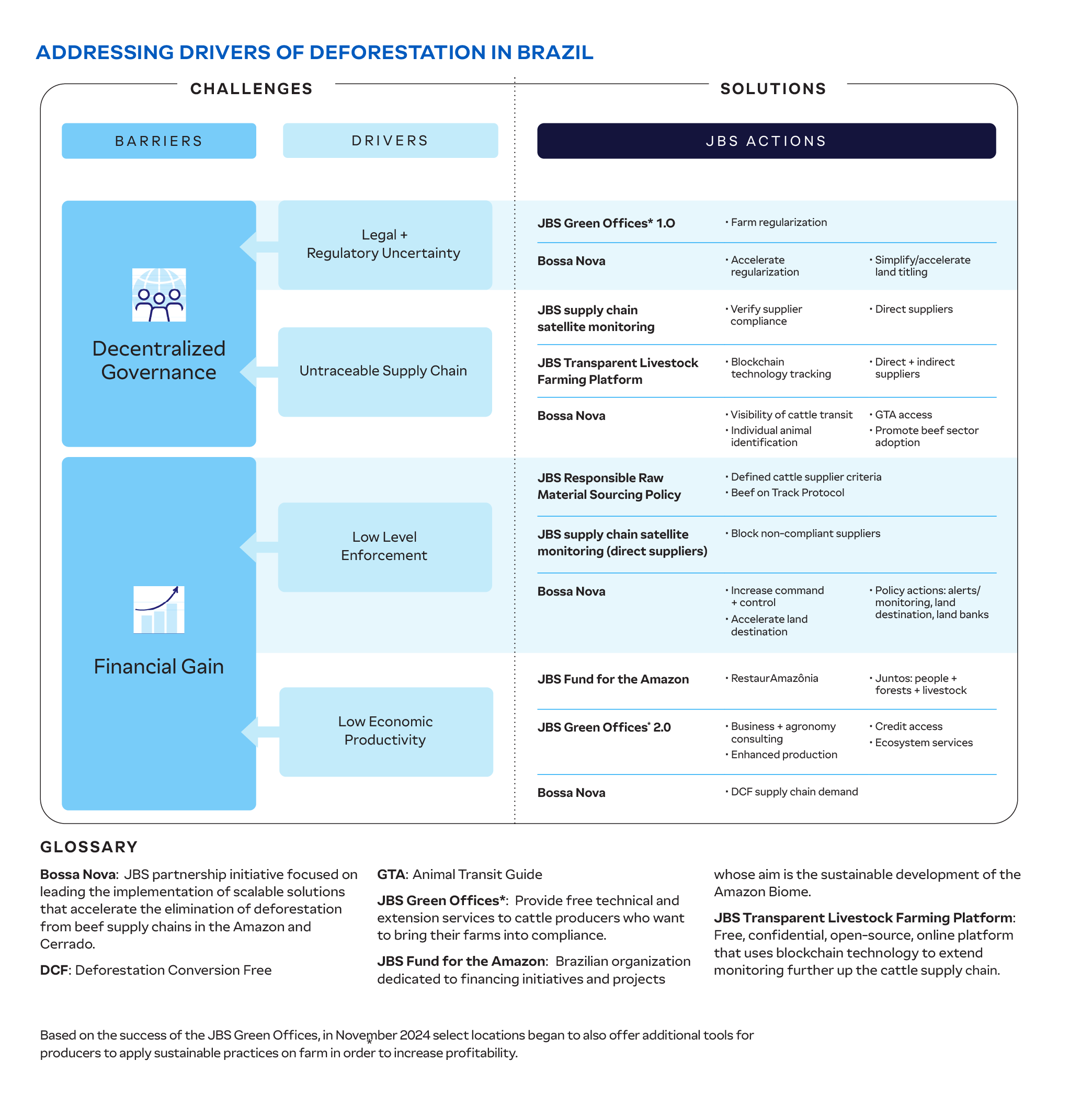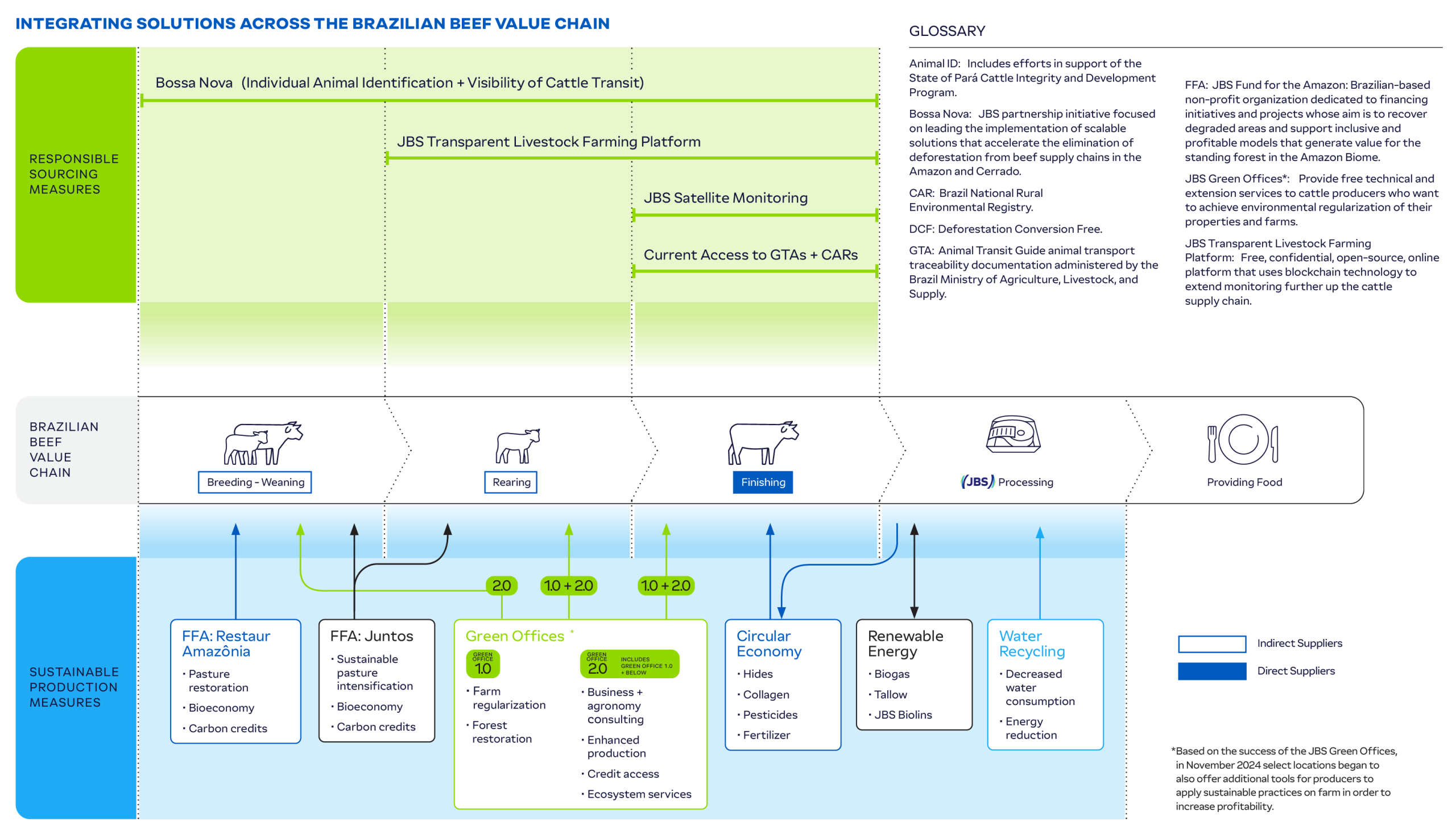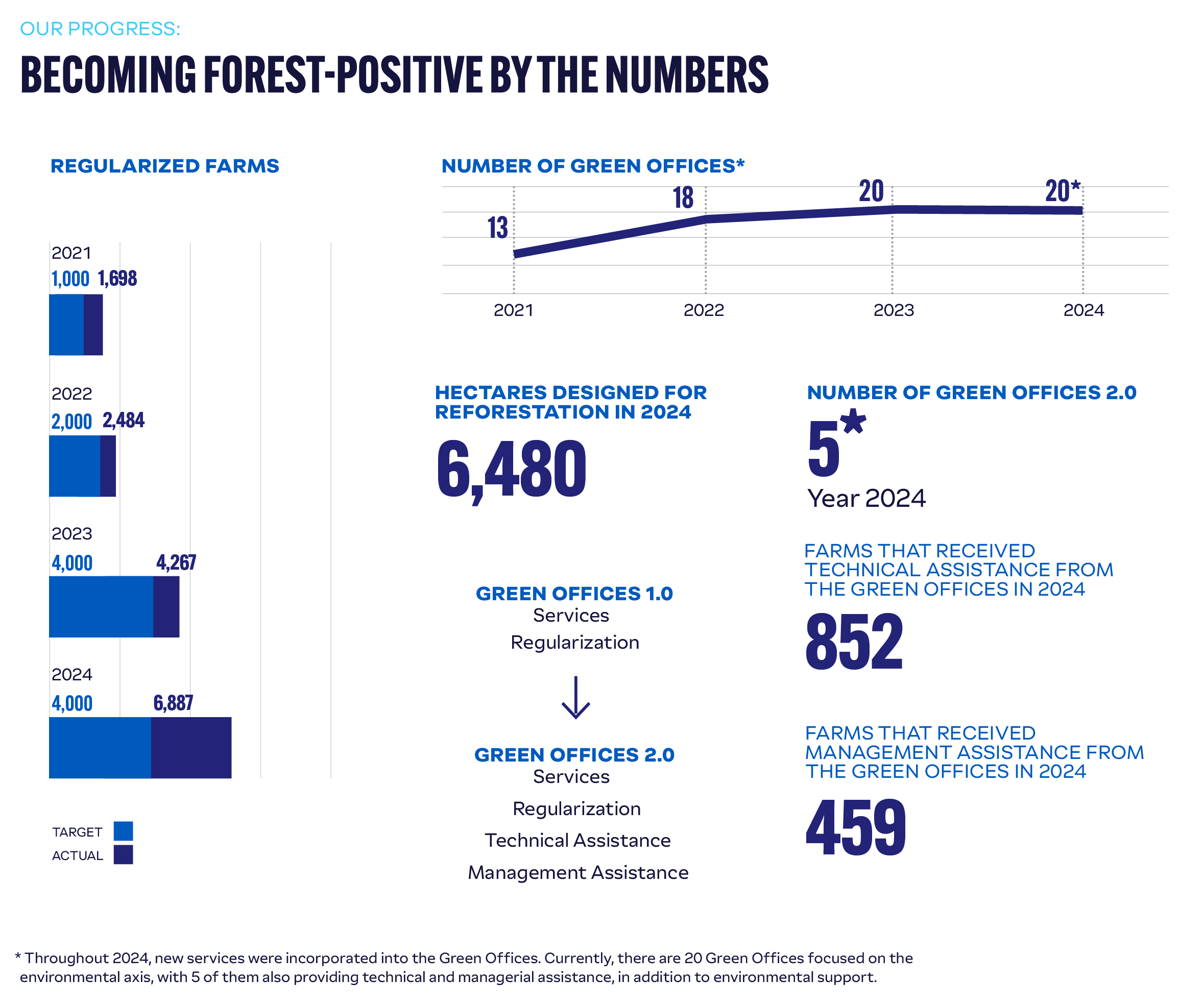Our Environment

Land Management
(GRI 2-23)
Combating Agriculture-Related Deforestation
Brazil has the largest geographical area under environmental protection in the world, making it a global leader in conservation efforts. The Brazilian Forest Code is a landmark law that requires all rural properties to maintain areas of native vegetation cover, known as Legal Reserves, to verify the sustainable economic use of natural resources while promoting biodiversity conservation. Despite these protections, deforestation in Brazil occurs in both legal and illegal forms, posing significant challenges to environmental sustainability.
Recognizing this, JBS’s Deforestation-Free Sourcing Policy prohibits all deforestation—whether legal or illegal—in the Amazon biome and illegal deforestation in other biomes. This strict policy reflects our dedication to preserving Brazil’s unique ecosystems and supporting the long-term health of its agricultural landscapes. We are implementing a comprehensive strategy supported by significant investments in key Brazilian biomes like the Amazon and Cerrado. Our approach combines strict standards, advanced monitoring systems, and producer support to maintain compliance while fostering economic opportunities for farmers and communities. Below, we outline the JBS strategy and investments driving progress toward eliminating deforestation in our Brazilian cattle supply chain.


Our Forest-Positive Action Plan
(GRI 2-23)
Through our Forest-Positive Action Plan, we aim to tackle the root causes of deforestation while balancing agricultural growth with environmental stewardship. This plan serves as a framework for developing a resilient food system that benefits farmers, communities, and the planet.
To advance forest-positive practices, JBS has set the following ambitions:
- 1. Delivering zero illegal deforestation in all Brazilian biomes by the end of 2025 for direct1 and tier 1 indirect2 cattle suppliers
- Advancing the Tropical Forest Alliance−aligned “Roadmap to 1.5°C” implementation plan for the Cattle Sector in the Amazon and Cerrado biomes.
- The Amazon:The Amazon: 2023 target date for no-deforestation for direct suppliers and 2025 for indirect suppliers (legal and illegal, PRODES 2008)
- The Cerrado and other biomes: 2025 target date for no illegal deforestation (PRODES 2020) for direct and indirect suppliers
(Note: JBS Friboi met these goals for its direct cattle suppliers in 2023 and continues to address deforestation risks within its network of direct and tier 1 indirect cattle suppliers.)
1. Direct Cattle Suppliers = Supply directly to JBS2. Indirect Tier 1 Cattle Suppliers = Supply to JBS direct cattle suppliers
Mobilizing the Agricultural Value Chain Toward Zero Deforestation
JBS employs a comprehensive, five-pronged strategy to eliminate deforestation risks and advance sustainable practices across its supply chain:
- Zero-Tolerance, Zero-Deforestation Sourcing Policy
Our Responsible Raw Material Procurement Policy prohibits purchases from farms involved in deforestation, forced labor, or violations of indigenous territories. Suppliers must adhere to the Beef on Track Protocol if located in the Amazon biome and the criteria of the Cerrado Voluntary Protocol in other biomes. Both establish rigorous monitoring, auditing, and reporting standards for a deforestation-free beef supply chain. JBS is also actively engaged in advancing the Cerrado Voluntary Protocol and participates in the Indirect Suppliers Working Group (GTFI), contributing to the development of monitoring criteria and sector-wide standards to enhance transparency and sustainability across the supply chain.
In 2024, Seara launched its Sustainable Grain and Oil Sourcing Policy, following the same deforestation criteria as the cattle sourcing policy.
We acknowledge the complexity of addressing deforestation across vast supply chains and endeavor to strengthen enforcement mechanisms to maintain compliance. As such, we continue to refine our policies and tools to address both legal and illegal deforestation risks effectively. - Supply Chain Monitoring and Enforcement
JBS has implemented an advanced cattle supplier monitoring system that utilizes public and government databases, satellite imagery, and geo-referenced data to monitor over 61 million hectares of supplier farms. Direct suppliers found to be non-compliant with our policies criteria are automatically blocked in our system, preventing any commercial transactions until the issue is resolved. This enforcement mechanism helps certify that only suppliers aligned with our standards remain in our supply chain. Verification of direct livestock suppliers’ compliance with socio-environmental standards is fundamental to ensuring the integrity of supply chains.
The monitoring system is based on data from PRODES (Monitoring Program for the Amazon Forest by Satellite), developed by INPE (Brazilian National Institute for Space Research). According to PRODES, deforestation is defined as the conversion or suppression of primary vegetation cover due to anthropogenic activities and covers all Brazilian areas.
Privacy laws can limit access to upstream transactions with indirect cattle suppliers, so our Transparent Livestock Platform uses blockchain technologyto extend monitoring to indirect suppliers and producers with whom the company does not have a direct business relationship, but who are a critical part of the supply chain. In 2024, more than 85% of cattle processed by JBS were enrolled in the platform. Beginning in 2026, all direct suppliers who wish to do business with JBS must be on the platform. For 2025, we are working toward an internal goal of registering 100% of direct suppliers on the Transparent Livestock Platform.
The Cattle Origin Declaration is issued directly through the Transparent Livestock Platform for compliance at all known farms where the animals were raised before processing. These properties are subjected to socioenvironmental analysis following the criteria of the sectoral protocols selected by the direct producer, and the document is only validated if all are in compliance. This process is part of our effort to meet the requirements of the European Union Deforestation Regulation, adopting a socioenvironmental protocol aligned with European legislation, in place of the internal protocol currently used by JBS.
Case Studies:
Sourcing policies and compliance systems effectively block non-compliant suppliers from the JBS supply chain, but providing economic incentives is essential to further discourage forest clearing and promote sustainable practices. Through initiatives like Green Offices, JBS provides free technical support to help farmers comply with the company’s Responsible Raw Material Procurement Policy, adopt sustainable practices, and enhance productivity. Since 2021, Green Offices have assisted over 15,000 farms to come back into compliance with Brazilian environmental laws, facilitating the reforestation of over 6,480 hectares in 2024 alone. Building on this success, Green Offices 2.0 now offer tools for implementing enhanced production and agronomy techniques, increasing profitability for smallholder farmers. In 2024, the service was expanded to support grain suppliers. Additionally, the Fazenda Nota 10 (“A+ Farm”) Program provides agronomic and business planning services to sustainably intensify production while reducing incentives for illegal forest clearing.
JBS has firsthand insight into supply chains vulnerable to deforestation risks through its strong presence in Brazil and daily engagement with producers. JBS actively participates in global forums such as the United Nations Climate Change Conference of the Parties (COP), the World Economic Forum, and the Tropical Forest Alliance-supported Agriculture Sector Roadmap to 1.5°C to develop solutions that tackle the root causes of deforestation, including those linked to beef production.
The JBS Fund for the Amazon supports projects that promote the restoration of degraded areas, the adoption of sustainable agricultural and livestock practices, inclusive socioeconomic development, and innovation in the Amazon region. As of June 2025, the Fund has supported 20 projects, committed R$71.4 million, benefited approximately 7,800 families, and contributed to the sustainable use and conservation of over 991,000 hectares of land. These efforts reinforce JBS’s dedication to fostering sustainable development and improving the quality of life of rural and forest-dependent populations in Amazon Region.
Green Offices Program in Brazil
(GRI 101-1, GRI 101-2, GRI 101-3)
The Green Offices program, operated primarily by Friboi and Seara, focuses on the environmental regularization of farms that have not met the socio-environmental criteria outlined in the Beef on Track 2.0 Protocol, Responsible Raw Material Procurement Policy and Sustainable Grain and Oil Sourcing Policy. Offered at no cost, the program serves as a key tool to promote sustainability across the supply chain. With the aim of assisting cattle ranchers throughout Brazil, especially those located in the Amazon and Cerrado biomes, JBS inaugurated 20 Green Offices in processing facilities across key cattle-producing regions. The program operates through three main branches:


Case Studies:
The JBS Fund has initially committed R$10 million in repayable resources, in partnership with Rio Capim – a spin-off of Belterra – to develop a pre-competitive model for sustainable livestock production. The model could be replicated and expanded through new regional partnerships, scaling sustainable livestock practices across the Amazon. Through this approach, the JUNTOS program seeks to unlock access to rural credit and attract additional public and private investment to accelerate the transition to sustainable cattle ranching.
